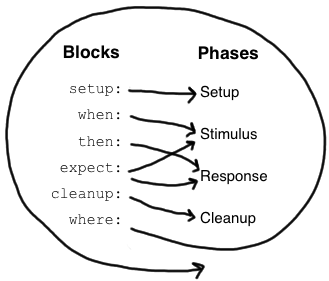Spock Framework을 이용한 Unit test 작성
Java Application을 개발하면서 Unit Test를 작성을 할때 jUnit과 Mockito를 이용하여 작성을 할수도 있지만 테스트 코드만 다른 코드로 간다면 좀더 쉽게 Unit Test를 작성을 할수 있다. 그 중에 Groovy를 언어를 이용한 Test 코드 작성에 대해 알아보자.
Reference
- http://spockframework.org/spock/docs/1.1/index.html
gradle
apply plugin: "groovy"
....
compile "org.codehaus.groovy:groovy-all:2.4.15"
testCompile "org.spockframework:spock-core:1.1-groovy-2.4"
- 기본적으로 Groovy를 언어를 사용하기 때문에 plugin과 groovy dependency를 추가를 한다.
specfication
class MyFirstSpecification extends Specification {
// fields
def obj = new ClassUnderSpecification()
def coll = new Collaborator()
// fixture methods
// feature methods
// helper methods
}
fixture method
def setup() {} // run before every feature method
def cleanup() {} // run after every feature method
def setupSpec() {} // run before the first feature method
def cleanupSpec() {} // run after the last feature method
- 이미 고정이 되어있는 매서드, test class를 시작될때나 등의 cycle에 대해 매서드 이름을 통해 실행시킬수가 있다.
feature methd
def "pushing an element on the stack"() {
// blocks go here
}
- method에 문장 형식의 이름을 넣을수가 있다.
block

when/then
when:
stack.push(elem)
then:
!stack.empty
stack.size() == 1
stack.peek() == elem
- when : 실제 코드를 테스트 하는 부분
- then : 테스트 이후 검증
setup/when/then
def "HashMap accepts null key"() {
setup:
def map = new HashMap()
when:
map.put(null, "elem")
then:
notThrown(NullPointerException)
}
where
def "computing the maximum of two numbers"() {
expect:
Math.max(a, b) == c
where:
a << [5, 3]
b << [1, 9]
c << [5, 9]
}
- where 를 이용하여 데이터의 조합을 넣을수가 있다.
with
def "offered PC matches preferred configuration"() {
when:
def pc = shop.buyPc()
then:
with(pc) {
vendor == "Sunny"
clockRate >= 2333
ram >= 406
os == "Linux"
}
}
documenation
setup: "open a database connection"
// code goes here
and: "seed the customer table"
// code goes here
and: "seed the product table"
// code goes here
Mocking object
def subscriber = Mock(Subscriber)
def subscriber2 = Mock(Subscriber)
subscriber.receive(_) >> "ok"
| | | |
| | | response generator
| | argument constraint
| method constraint
target constraint
- Mock 을 이용하여 mock object를 생성을 할수가 있다.
- >>를 이용하여 mock object에 해당하는 매서드의 리턴값을 mocking 할수가 있다.
Argument Constraints
1 * subscriber.receive("hello") // an argument that is equal to the String "hello"
1 * subscriber.receive(!"hello") // an argument that is unequal to the String "hello"
1 * subscriber.receive() // the empty argument list (would never match in our example)
1 * subscriber.receive(_) // any single argument (including null)
1 * subscriber.receive(*_) // any argument list (including the empty argument list)
1 * subscriber.receive(!null) // any non-null argument
1 * subscriber.receive(_ as String) // any non-null argument that is-a String
1 * subscriber.receive({ it.size() > 3 }) // an argument that satisfies the given predicate
// (here: message length is greater than 3)
Sequence of returns
subscriber.receive(_) >>> ["ok", "error", "error", "ok"]
- where 문과 동일
Computing Return Values
subscriber.receive(_) >> { args -> args[0].size() > 3 ? "ok" : "fail" }
subscriber.receive(_) >>> ["ok", "fail", "ok"] >> { throw new InternalError() } >> "ok"
'Programing > Java' 카테고리의 다른 글
| Java Object 비교 == (0) | 2018.07.25 |
|---|---|
| Spring RestTemplate (0) | 2018.07.22 |
| Java Stream을 이용한 Inner Join / Left Join 기능 (0) | 2018.06.18 |
| Lombok 상위클래스 필드를 이용한 객체 생성 방법 (0) | 2017.08.06 |
| Lombok @Builder Default Value 사용하기 (0) | 2017.08.06 |